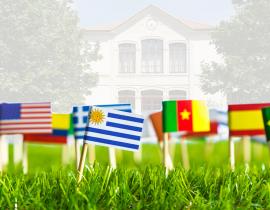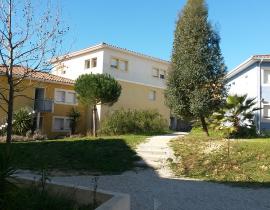Become a general engineer in the life sciences
|
What type of training ? |
une formation diplômante, sous statut étudiant |
|---|---|
|
For who ? |
étudiant titulaire d'un diplôme français, étudiant international |
Objective
The programme aims to train general engineers in the life sciences, enabling them to understand scientific, technical, socioeconomic, human and cultural factors to make decisions in a changing environment.
- Courses and lectures examine general models illustrating a select number of examples and concepts and focus on the acquisition of methodologies and procedures.
- Pragmatism, an experimental spirit and a scientific approach are developed through practical exercises, tutorials and field trips, representing about 40% of programme activities.
- The weekly volume of instruction, about 25 hours, is organized to allow free time for individual study and extra-curricular activities, including sports.
Themes
- precision farming, ICT
- agronomy, agroecology
- agrifood, food science, nutrition, process engineering
- plant breeding
- biodiversity knowledge and management
- ecotechnologies, green chemistry
- markets, sectors and agricultural and agrifood companies
- plant protection
- natural resources, environment, territories
- vine and wine
-
Programme
Language of instruction : In French
The Agricultural Engineering curriculum promotes an international outlook thanks to a rich cultural mix and increasing opportunities to study with one of our academic partners. Over the three-year programme, students earn the equivalent of a Bachelor of Science (at the end of the first year), a Master of Science 1 (at the end of the second year) and a Master of Science 2 (at the end of the third year).
Career counselling over the three years helps students tailor the curriculum around their individual interests.
- B.Sc. covers all of the subjects essential to a future agricultural engineer, providing each student with essential knowledge required to pursue the programme and in a range of possible jobs. Composed of 2 semesters, it includes an internship in an agricultural company, an engineering student project and career guidance support.
- M.Sc 1 is structured around two key choices. During the 1st semester (semester 7), students choose from among 3 pre-specializations; during the 2nd semester (semester 8), they either choose from among 7 specializations or depart on an exchange programme.
- M.Sc 2 offers the possibility to choose from 6 packages of 15 Montpellier SupAgro options.
-
Admissions
- B.Sc: through national competitive examinations
- M.Sc 1: through competitive examinations for international candidates
- M.Sc 2: admission requirements are specific to each option
Registration
Fees
- Each year: €1,831 or €4,449* (see conditions, in French) + €100 Contribution Vie Etudiante et de Campus (CVEC) administrative fee
* Tuition fees for non-European Union students enrolled in regular programs (excluding those in priority solidarity zone, international agreements, re-enrollments, refugee students, and dependent students).
- DNO (2nd year): €243 + €100 Contribution Vie Etudiante et de Campus (CVEC) administrative fee
Contacts
L'Institut Agro Montpellier
2 place Pierre Viala
34060 Montpellier - France
Tél. : +33 (0)4 99 61 22 00 Tél. : +33 (0)4 99 61 22 00
Fax : +33 (0)4 99 61 29 00
contact@supagro.fr















